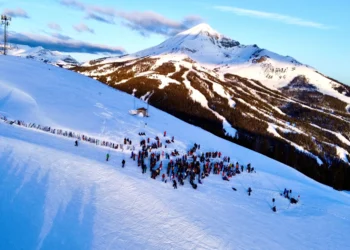Senate Bill 172 awaits Gov. Gianforte’s signature; law will impact Cold Smoke project in Big Sky
By Jack Reaney SENIOR EDITOR
Resort communities around Montana are one autograph away from having a new tool in their workforce housing toolbox.
Proposing to allow communities to use revenues from “1% for infrastructure” resort tax for housing projects, Senate Bill 172 quickly gained support of Big Sky leaders when an earlier Big-Sky-backed proposal, HB 162, stalled in senate committee in early February.
David O’Connor, executive director of the Big Sky Community Housing Trust, said SB 172 is “damn near identical” to HB 162, noting that both bills were drafted independently—it magnifies the housing challenge to see separate communities conceive the “exact same” idea without collaborating, O’Connor told EBS.
“The fact that we had two bills come from two different communities that wasn’t a coordinated effort, is just further evidence that the housing problem is not unique to Big Sky,” said John Zirkle, board member with the Big Sky Resort Area District, which administers Big Sky’s resort tax. BSRAD favored the flexibility offered by HB 162 and, consequently, SB 172.
Introduced on Jan. 17 by Sen. Dave Fern (D-Whitefish), SB 172 passed the senate on Feb. 12, and the house on March 21, according to the Montana Free Press Capitol Tracker. It awaits final signature from Gov. Greg Gianforte.
Immediate impact to Cold Smoke project
In Big Sky, the bill will impact workforce housing projects long into the future but brings immediate implications for the Cold Smoke development as Big Sky voters prepare to decide on an up-to-$60 million resort tax bond to fund the 264-apartment,125-single-family-home development.
Under the Cold Smoke Bond, BSRAD would bond up to $45 million for the Big Sky Community Housing Trust to acquire the land, and O’Connor said one community concern is the potential impact of long-term public debt on other organizations that receive grants from Resort Tax.
But under SB 172, expensive housing projects like Cold Smoke can use funds from the 1% infrastructure revenues, taking pressure off the regular 3% resort tax collections, which fund most of BSRAD’s nonprofit and government service grants.
“It allows us to leverage resort tax to make a large investment in land without having any impact at all on annual grant collectors,” O’Connor said. “Because the 1% is completely separate from the 3%.”
Zirkle explained that before SB 172, it was an “either-or” proposition to fund large-scale housing projects as they competed for the same 3% collections pool.
O’Connor noted, “We don’t ever want… a choice between affordable housing and Music in the Mountains, or affordable housing or Morningstar [Learning Center] scholarships.”
The new law is a “big win,” Zirkle added, calling it the most important bill for Big Sky in the current legislative session.
“I think the main takeaway is that with the powers of the 1%, the 3% and bonding, what I am convinced of is that BSRAD can afford [Cold Smoke] without meaningfully or significantly altering momentum for other organizations around town,” Zirkle said. “… We have the maximum amount of tools to diversify our financing strategy to make it affordable in the long run for Big Sky.”
In resort tax communities across Montana, and other mountain towns across the West, Big Sky differs in that it hardly owns any of its own land, O’Connor explained. Typically, communities bring land to the table when considering an affordable housing project.
“Big Sky just has zero resources for that… As soon as we start talking about our affordable housing projects, we are, right away, very much behind the eight-ball,” O’Connor said.
In the example of Cold Smoke, the Big Sky community must invest tens of millions to acquire the land. The ability to draw resort tax revenues from a specific infrastructure reserve—Zirkle said the 1% tax collects roughly $5 million annually—allows Big Sky to chip away at its community land deficit.
“We hope that over decades, the housing trust will continue to leverage this resource,” O’Connor said.
Rep. Griffith stands up for home ownership
As SB 172 made its way through the House of Representatives, Rep. Bill Mercer (R-Billings) proposed an amendment to restrict the funds to rental homes, excluding projects involving home ownership.
In Big Sky, projects like Cold Smoke or the existing MeadowView condominiums aim to provide home ownership opportunities for local workers.
Alanah Griffith (D-Big Sky) voiced her opposition on the house floor, arguing for the importance of home ownership and effectively killing the amendment, with help from many leaders from resort tax communities, she explained.
Griffith said SB 172 is a “wonderful” bill for resort tax communities like Big Sky and West Yellowstone, enabling communities to attract and retain teachers, firefighters, sheriff’s deputies and other “essential” workers.
“It’s fairly easy, in the scope of things, to get money for rental homes. It is another thing entirely to get money for homes that can be owned by the local community,” Griffith told EBS. “… The proposed amendment, basically, would have killed the Cold Smoke project entirely.”
Zirkle pointed out that Cold Smoke is only one step along Big Sky’s road to meeting its housing needs—based on Big Sky’s housing needs assessment, created in 2018 and updated in 2023 by the housing trust, the community needs roughly 1,300 additional housing units by 2028. Cold Smoke would account for nearly 400.
“When we talk about housing, we have to remember that Cold Smoke is not going to solve everything… So there’s going to be more community housing projects down the road,” Zirkle said.
“Setting up this lane… for funding community housing projects through the 1% and 3% enables us to actually get our arms around this problem.”













